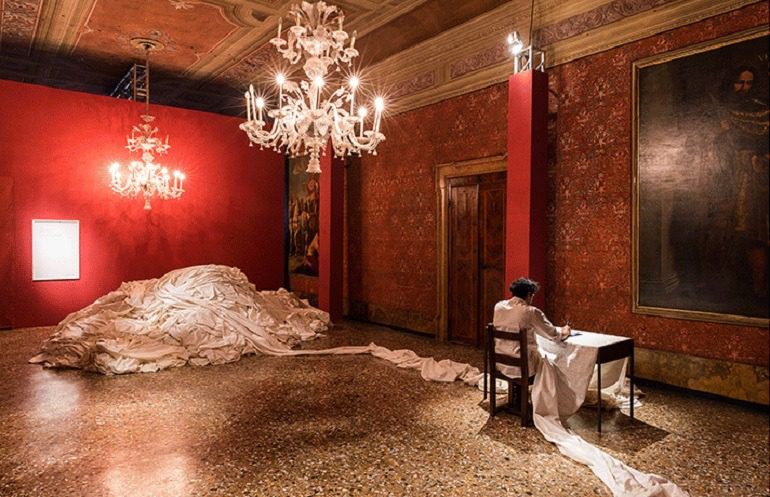ART & DESIGN
Installation views, My East is Your West, 2015, an exhibition that unites the historically conflicting nations of India and Pakistan at the Venice Biennale. Here, India Meets Pakistan. Photo: Mark Blower. Courtesy Sutton PR
ART REVIEW
India Meets Pakistan at Venice. An exhibition at Venice Biennale investigates the conflict between India and Pakistan, two mortal enemies with common cultural cartography.
BY KAZAD

Installation view, My East is Your West, 2015, an exhibition engendered by the history of India and Pakistan. Here, India Meets Pakistan. Photo: Mark Blower. Courtesy Sutton PR
VENICE, ITALY— It is a well-known fact that the relationship between India and Pakistan is a tense one. For years, both countries have been at loggerheads on the issues of terrorism, nuclear power, and territorial infractions. This is one reason it is so refreshing to see the two countries collaborating on an art project.
India Meets Pakistan
At the 56th International Art Exhibition at Venice Biennale is a landmark exhibition that unites India and Pakistan. For the first time at the Biennale, the historically conflicting nations are together under one tent. Titled My East is Your West, the exhibition brings together two artists from both countries: Shilpa Gupta (Mumbai) and Rashid Rana (Lahore). Gupta lives and works in Mumbai, India. She studied sculpture at the Sir J. J. School of Fine Arts from 1992 to 1997. Rana was born in Lahore. He lives and works in Pakistan. Rana trained as a painter at the National College of Arts in Lahore (Pakistan) and the Massachusetts College of Fine Arts in Boston.
The exhibition has become a major point of discussion at the Venice Biennale on how art brings enemies together since it opened.
Gupta and Rana present a new series of works at the Palazzo Benzon situated in the center of Venice on the Grand Canal. Since neither India nor Pakistan has a permanent national pavilion in Venice, this exhibition is a unique opportunity for South Asia artists to insert themselves into a dialogue through the arts, while representing the Indian subcontinent as one region.
Shilpa Gupta
My East is Your West shows the desire to disentangle and create a clear perspective of the complex climate of historical relations between South Asia’s nation-states which have become major sources of conflict in recent times. The main objective of the exhibition is to show that the region has shared cultural cartography that can be explored for peace.
Informed by a light installation by Shilpa Gupta, the works in the My East is Your West explore different media to present the shared experiences of South Asia’s countries. Shilpa Gupta’s new series of works attempts to address some of the issues of security, nuclear power, and border control.
ART NEW | READ ALSO: Curator June Yap Centers Asian Art at Guggenheim Museum
They are the result of over four years of ongoing research in the India-Bangladesh borderlands and the world’s longest security barrier between two nation-states currently in construction. Exploring installation, video, photography, drawings, text-based pieces, and performance Gupta draws attention to the fact that, in spite of all the conflicts, what is of utmost importance is peace and good relationship especially since both nations have a common cultural cartography.
Rashid Rana
Like Gupta, Rashid Rana furthers the discourse on shared experience with her work. In an immersive setting across five rooms, she investigates the conception of presence, temporality, and location as a collective experience, across digital printmaking, video, and installation. A live stream video work, produced in collaboration with the Lahore Biennale Foundation helped communicate her concept of shared experience even better. In the video installation, viewers are transported from Venice to Lahore and vice versa.
Although unique in their artistic approach, both artists expressed common thoughts about how history has continued to inform the conflict between the two countries. The history which transcends antiquity, colonial-era modernity, and cosmopolitanism shows how the past continues to shape the present. It reveals how the past continues to influence the future relationship between the two nations entangled in the conflict. While conscious of the conflict provoked by history, Shilpa Gupta and Rashid Rana did not lose sight of the entangled realities of the Indian subcontinent. To actualize their thoughts, they developed a material aesthetic that surveys the potential of a common region, separate from the state and its model.
My East is Your West was commissioned by The Gujral Foundation, a non-profit trust. It is dedicated to supporting contemporary cultural engagements in the areas of art, design, and culture in the Indian subcontinent. The Foundation was founded in 2008 by Mohit and Feroze Gujral, son and daughter-in-law of renowned Indian Modernist artist, Satish Gujral. Since its inception, the Foundation has worked with international institutions and museums to bring attention to works of artists in the Indian subcontinent.
Asian Art Artists
In 2012, The Gujral Foundation arranged the loan of ‘Aspinwall’, the primary location of the Kochi Muziris Biennale 2012 and 2014. It also supported South Asian artists at the 8th Berlin Biennale. These are just a few of what The Gujral Foundation has been doing to insert Asian art into global art discourse. As more South Asian artists continue to make incursions into Western metropolises, the Foundation continues to foster a range of projects as it steadily expands its reach in the world of contemporary art.
In addition to My East is Your West, Gupta and Rana also discussed their experience working together during an artist talk at the Palazzo Benzon. They were joined by Naeem Mohaiemen, who is also exhibiting at the Venice Biennale. The conversation titled Imagined Cartographies allowed an insight into practice and contemporary art in South Asia. The talk was moderated by Curatorial Advisors for the project, Natasha Ginwala, and Martina Mazzotta.
My East is Your West shows how art can effectively bridge historical gaps that continue to inform issues in contemporary times. The two artists in this exhibition reveal the fallacies and fault lines inherent in history. More importantly, they showed that beyond all the differences propagated by colonialists, India and Pakistan have shared cartography that can be better explored for a peaceful relationship. The artists also used their works to castigate those who have explored the faulty history of the two countries for their own political advantage. Gupta and Rana are certain that peace can be achieved through a deeper understanding of shared experience.
India Meets Pakistan in Venice

Installation view of My East is Your West, 2015, featuring works by Shilpa Gupta (Mumbai) and Rashid Rana who brought together the history of India and Pakistan. Photo: Mark Blower. Image courtesy Sutton PR
